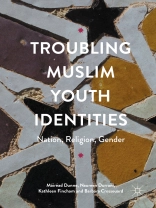This book explores the production of Muslim youth identities, with respect to nation, religion and gender in Pakistan, Senegal, Nigeria and Lebanon. As Muslim-majority, post-colonial states with significant youth populations, these countries offer critical case studies for the exploration of the different grammars of youth identities, and ‘trouble’ the perceived homogeneity of Muslims in local and global imaginaries. The authors offer rigorous and detailed accounts of the local, situated and contingent ways in which youth articulate their identities and sense of belonging, and the book reflects on the importance of affect, belonging and affiliation in the construction of youth narratives of identity as well as highlighting their political and contested nature.
Troubling Muslim Youth Identities will be of interest to students and scholars in the fields of development studies, social and cultural studies, gender, geography, education, and peace and conflict studies.
Table of Content
1. Introduction.- 2. Geographies of Identity.- 3. The Research.- 4. Pakistan: converging imaginaries in an Islamic state.- 5. Senegal: Muslim youth identities in a secular nation.- 6. Nigeria: Muslim youth and internal others in a multi-religious nation.- 7. Lebanon: National imaginaries, state fragilities and the Shi’a other.- 8. Conclusions: Intersecting nation, religion and gender.
About the author
Máiréad Dunne is Professor of the Sociology of Education and Director of the Centre for International Education at the University of Sussex, UK.
Naureen Durrani is Course Leader for MA International Education and Development (MAIED), University of Sussex, UK.
Kathleen Fincham is a Senior Lecturer in Education and Social Science at St Mary’s University, London, UK. Barbara Crossouard is Senior Lecturer in Education at the University of Sussex, UK and an active researcher working within the gender and youth citizenship strand of the Centre for International Education (CIE).












